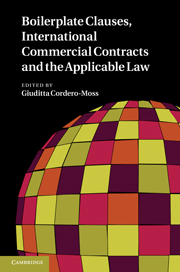Book contents
- Frontmatter
- Contents
- List of contributors
- Preface
- Introduction
- PART 1 How contracts are written in practice
- PART 2 Methodological challenges
- PART 3 The applicable law's effects on boilerplate clauses
- Introduction to Part 3
- 7 The common law tradition: application of boilerplate clauses under English law
- 8 The Germanic tradition: application of boilerplate clauses under German law
- 9 The Romanistic tradition: application of boilerplate clauses under French law
- 10 The Romanistic tradition: application of boilerplate clauses under Italian law
- 11 The Nordic tradition: application of boilerplate clauses under Danish law
- 12 The Nordic tradition: application of boilerplate clauses under Finnish Law
- 13 The Nordic tradition: application of boilerplate clauses under Norwegian law
- 14 The Nordic tradition: application of boilerplate clauses under Swedish law
- 15 The East European tradition: application of boilerplate clauses under Hungarian law
- 16 The East European tradition: application of boilerplate clauses under Russian law
- Conclusion: the self-sufficient contract, uniformly interpreted on the basis of its own terms: an illusion, but not fully useless
- Bibliography
- Index
- References
9 - The Romanistic tradition: application of boilerplate clauses under French law
from PART 3 - The applicable law's effects on boilerplate clauses
Published online by Cambridge University Press: 11 April 2011
- Frontmatter
- Contents
- List of contributors
- Preface
- Introduction
- PART 1 How contracts are written in practice
- PART 2 Methodological challenges
- PART 3 The applicable law's effects on boilerplate clauses
- Introduction to Part 3
- 7 The common law tradition: application of boilerplate clauses under English law
- 8 The Germanic tradition: application of boilerplate clauses under German law
- 9 The Romanistic tradition: application of boilerplate clauses under French law
- 10 The Romanistic tradition: application of boilerplate clauses under Italian law
- 11 The Nordic tradition: application of boilerplate clauses under Danish law
- 12 The Nordic tradition: application of boilerplate clauses under Finnish Law
- 13 The Nordic tradition: application of boilerplate clauses under Norwegian law
- 14 The Nordic tradition: application of boilerplate clauses under Swedish law
- 15 The East European tradition: application of boilerplate clauses under Hungarian law
- 16 The East European tradition: application of boilerplate clauses under Russian law
- Conclusion: the self-sufficient contract, uniformly interpreted on the basis of its own terms: an illusion, but not fully useless
- Bibliography
- Index
- References
Summary
Preliminary observations
Even in international matters, there is no such thing as ‘lawless contracts’ under French law, although it is perfectly admissible in international arbitrations to provide that the arbitral tribunal shall rule in ‘amiable composition’, which does not require the tribunal to apply a law except for fundamental rules of due process and international public policy. However, by virtue of the principle of contractual freedom, a contract governed by French law may also refer to other norms and customs, e.g., the trade practices of the shipping industry. The general observations contained in this chapter must therefore be adapted to the specific business norms and customs that may apply to a given contract according to the field of activity involved.
These general observations should also be qualified to take into account the general approach of French judges towards contracts. The Civil Code does contain a few rules of construction in Articles 1156–1164. One should, however, point out certain qualifications regarding their exact scope and effect:
– First of all, the French Supreme Court decided that these rules of interpretation are not mandatory.
This lack of mandatory character applies to all rules of interpretation, including the rule provided by Article 1162 of the Civil Code, according to which: ‘when in doubt a contract is interpreted against he who stipulated and in favour of he who contracted the obligation.’ This is the equivalent of the English law principle of contra proferentem. […]
- Type
- Chapter
- Information
- Publisher: Cambridge University PressPrint publication year: 2011



